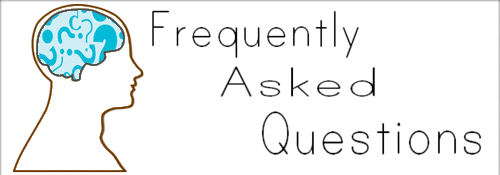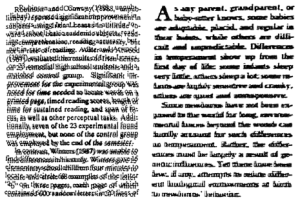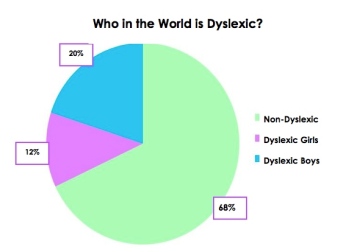
12 Frequently Asked Questions
-
What is dyslexia?
Simply put, dyslexia is a learning disability. While this answer is the most basic, dyslexia is a complicated condition. Dyslexics follow a range, some experience very severe symptoms and some are affected only minimally by the disability. Dyslexia primarily impacts literacy and language skills, though some people may experience difficulty understanding instructions, an inability to switch quickly from one activity to another, or an inability to tell directions or distinguish right from left. Dyslexia cannot be defined in a simple way if one considers the wide spectrum that the disability encompasses. For a more thorough answer and a summary of some symptoms, visit our What is Dyslexia? post.
-
How do I know if I am dyslexic?
Symptoms of dyslexia begin to appear around the age of 7 or 8 when a child begins to learn in school, though signs of the disability may be present before this age. Signs that a person may be dyslexic include:
– Letter and number reversals
– Difficulty transferring words in a book or on a board onto paper
– Inability to remember content, sequence of events, or the summary of something
– Trouble spelling
– Difficulty making small, precise movements, such as when writing
– Inability to learn and remember new words Dyslexia can also impact a student’s performance in school beyond academics. Dyslexic students may experience the following.
– Feeling stupid or unintelligent
– Acting depressed or withdrawn
– Appear to be unmotivated and lazy
– Being bullied for their apparent stupidity and differences
-
Does dyslexia effect more girls or boys?
It is a common impression that dyslexia impacts a higher number of males and females. This idea is a misconception. The reality is that nearly equal numbers of boys and girls have dyslexia. Researchers wonder whether more boys are dyslexic, or whether they are simply more likely to be diagnosed.
-
How is dyslexia diagnosed?
Dyslexia is difficult to diagnose due to the lack of obvious physical symptoms and the variability of the disability. The tests to analyze whether a person has a learning disability are standardized and highly reliable. They observe a person’s intake and breakdown of information, their reading ability, how they learn best, and how all of the person’s senses work together to process information. These tests are administered by either private professionals or ones provided by schools and while a diagnosis does not solve a dyslexic’s problem, having an official answer to why a dyslexic feels, thinks, and learns differently than another person is often appreciated.
-
Can dyslexia be cured?
No, there is no ‘cure’ for dyslexia because it is not a disease or sickness. Dyslexia is a difference in how the brain is wired and how the various parts of the brain work together.
-
How can dyslexia be treated?
There is no ‘treatment’ that will reverse of dyslexia, just like there is no ‘cure’. However, the frustrating symptoms caused by the disability can be somewhat lessened. Spending extra time outside of class with a tutor, teacher, or even parent helping the student to read, write, and take on those topics they experience difficulty with, dyslexic students can improve. When it comes to dyslexia, practice might not make things perfect but it can help immensely.
-
What causes dyslexia?
Dyslexia is a genetic disability and therefore is inherited by a child. If a child is dyslexic, it is likely that at least one of their parents is as well. While the exact causes of dyslexia are still somewhat debated, the most definitive research suggests that a dyslexic brain is organized in a slightly different way. This slight reorganization activates different parts of the brain when processing information (parts that people without dyslexia would not use) and certain nerves do not connect, or cannot connect as effectively as those in brains without dyslexia.
-
Does dyslexia always come with ADD or ADHD?
Dyslexia and ADD/ADHD are two entirely separate conditions, caused by different variables, creating different symptoms, and treated in different ways. However, research shows a high probability that a person with a specific learning difficulty (such as dyslexia) will have at least two other difficulties including autism, asperger syndrome, ADHD, or dyspraxia. While dyslexia does not cause ADD/ADHD and does ADD/ADHD cause a person to be dyslexic, it has been found that about 40% of people who are dyslexic also have ADD or ADHD. Overall, however, dyslexia is not always accompanied by ADD or ADHD.
-
Is dyslexia a visual problem?
Because some dyslexics reverse letters or numbers when reading, people often assume the trouble lies within their vision. In reality, many dyslexics do not actually experience the reversal of symbols, and some people who are not dyslexic sometimes do! Some dyslexics experience words moving, blurred, or reversed on a page (like shown below) but some just have difficulty processing. Ultimately the ability to read and to read quickly and well lies within the brain, not the eyes and therefore dyslexia is not a visual problem.

Imagine if the next time you opened your favorite book, the text looked like this! This is similar to what a dyslexic might see when attempting to read.
-
Can people with dyslexia read?
Yes. Dyslexics can read, but most dyslexics experience difficulty and frustration when doing so. Trouble learning new words, distinguishing between letters, and processing the words into coherent information slows the dyslexic reader down and makes reading difficult, though in most cases it is still entirely possible.
-
Is dyslexia only a reading problem?
No. Most dyslexics do have trouble reading, as stated above, but difficulty reading is not the only symptom of this disability. Visit the Redefine Dyslexia ‘What is Dyslexia?‘ page for more information about other symptoms.
-
Can dyslexics still be intelligent?
Of course! Dyslexia has absolutely no impact on a person’s brain capacity and ability, even though it may make it difficult for that person to express their intelligence. Some research even suggests that some people with dyslexia may be even more skilled than their peers when it comes to certain tasks. People with dyslexia tend to be good at seeing the big picture, being creative and artistic, and discovering new ways to tackle and solve problems. Remember, dyslexia is a difference but not a deficit! Dyslexia does not lessen a person’s ability or intelligence in any way.
Do you still have questions? Feel free to comment with any additional inquiry you may have. You can also check out some of the following websites to learn more about dyslexia and read our What is Dyslexia? post!


Answering 12 frequently asked questions was a really good idea for a blog post. I myself am not very knowledgable about dyslexia, nor have really heard a lot of details about it. I like how this post puts to rest any rumors floating around about dyslexia before first-time learners have a chance to hear, or believe, them. The images you used as examples for what dyslexics might see when reading worked really well for two different reasons. For one, it gives readers a glimpse as to what it means for dyslexics to blur, reverse, or jumble words. It also was a great emotional appeal. I found myself fixed on the image on the left and couldn’t help think about how lucky I am to not see that every time I look at a collection of words. The image you made at the end was also really cool!
LikeLiked by 1 person